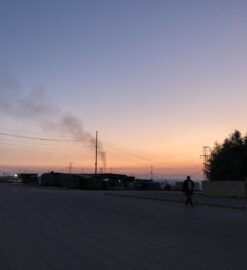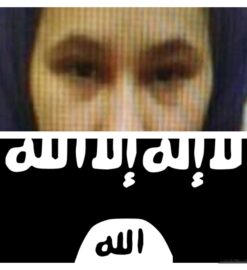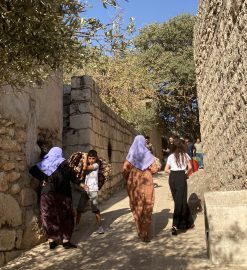Memorial speech: The ongoing genocide on the Yazidis
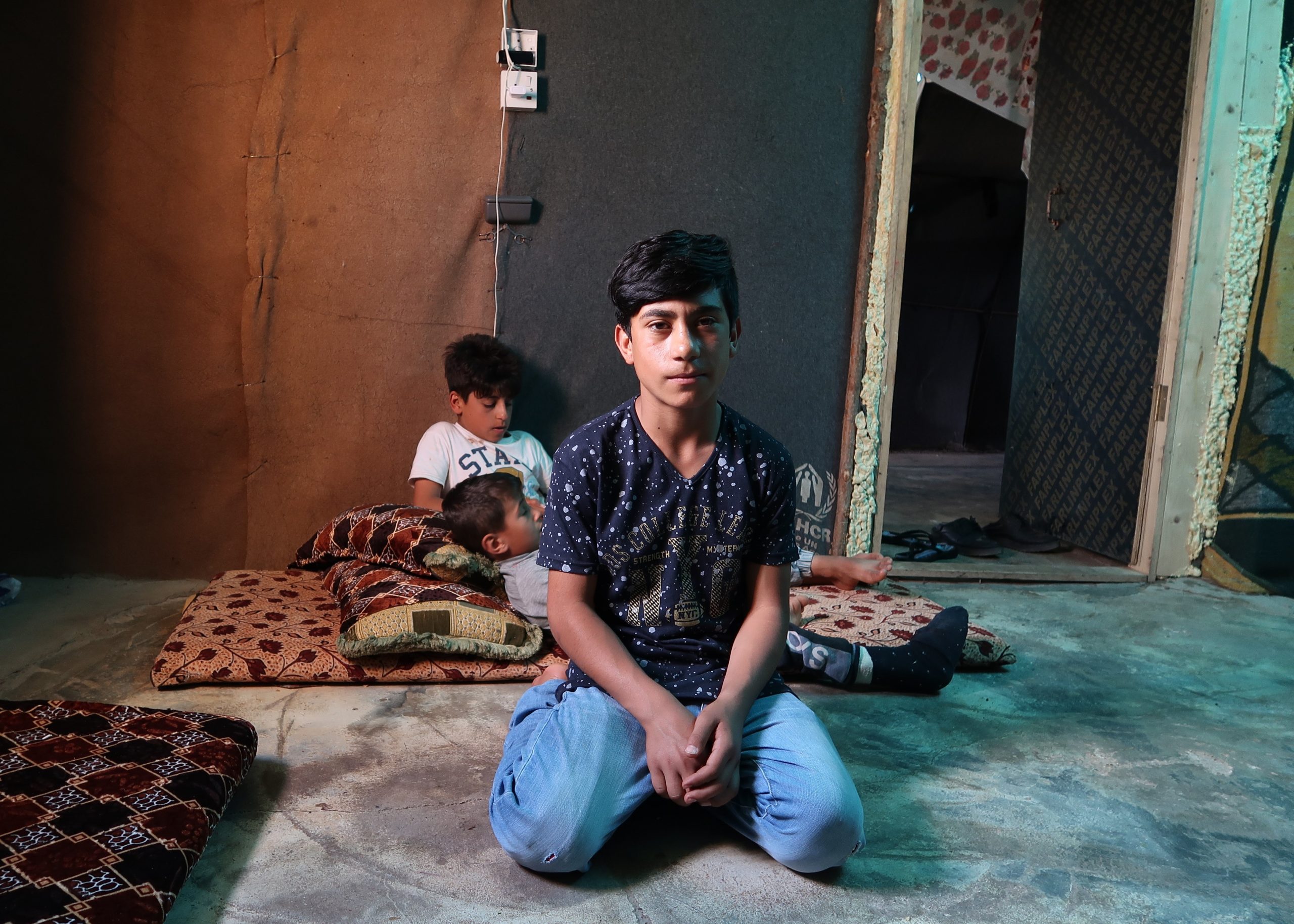
I wrote this story for an event at The Balie in The Netherlands on August, 15, 2021: The ongoing genocide on the Yazidis. It contains new information, but also translated parts from my book ‘The Forgotten People’ (chapter: Majdal).
Thank you so much for inviting me. It is an honor to stand here in front of you on the day we commemorate the victims of Kocho. When I was asked to prepare a story for this event, I was in doubt. Because where should I start? I spoke with dozens of women who had been enslaved, with boys who had been trained in boot camps, and with men who had lost their entire family in the blink of an eye. I heard how IS had sold the youngest children to adoptive parents or as servants. Islamic State had stopped at nothing in their attempt to wipe out the Yazidi community, and the genocide encompassed far more than the sex slavery which the media often highlighted.
I would like to tell you about every person I have met. About Jihan, a girl who was kidnapped for years, and who never gave up hope to be reunited with her missing father. About Ismael, whose brothers and parents were murdered, whose sisters were enslaved, and whose youngest brothers were forced to carry out a suicide mission. I also would like to tell you about Khudeda, who once had a beautiful family and a successful business, but now lives all alone in a refugee camp because IS took everything from him.
Yes, I would like to speak about all of them. Because they all represent the face of genocide, because the world needs to know what IS did to the Yazidis, because their stories matter. Those I interviewed were acquaintances who later became friends, and I visited them as often as I could. They were my eyes and ears, telling me about their life and the past, and I wrote it all down, often frustrated or in tears, but sometimes with a smile.
I wish you would get to know them all. But I must make a choice. So today, I will tell you something about Majdal, an ordinary Yazidi boy from Kocho who became a child soldier. To you, he may be one of the faces of the genocide, but when I look at him, I see a family member. A little brother.
The last time we met in Khanke camp, I asked for his permission to use his photo for my book cover. Majdal said he thought it was an honor and repeated that I was allowed to use the photo. But he did wonder why I had chosen an old photo? Wouldn’t it be better to take a new one, since he had grown quite a bit in recent years and his hair was different too? I told him that the old picture was fine. Majdal nodded, and with a mixture of old memories and determination in his eyes, he handed the photo back to me. Then he said something that people have been telling me year in year out, in every tent in every camp. ‘Tell the world what happened to us.’
And I will till I am grey and old. For Majdal, for all Yazidis.
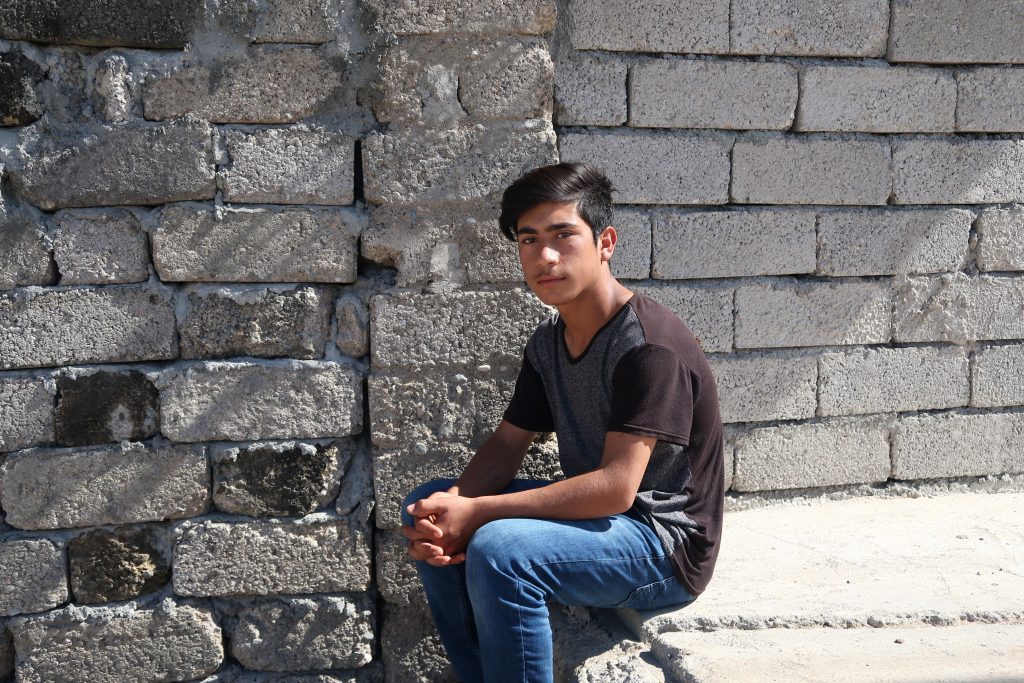
4. Majdal. An IS child soldier: ‘My friends are in heaven now.’
‘Look, that’s me when I was in Daesh,’ Majdal says, showing me an Islamic State propaganda video on YouTube. In the stifling refugee tent in Khanke, the harsh sound of a Jihadist nasheed drowns out the hum of the airconditioner. His cellphone displays images of a training camp for boys in the caliphate. There’s Majdal, wearing khaki camouflage, with an IS headband around his black hair. His face looks younger. ‘It’s still really strange to see myself like that,’ he says softly.
Today, Majdal is wearing sneakers and a T-shirt and he has a trendy haircut. At first, he seems like an ordinary fourteen-year-old, but he hasn’t felt that way for a long time. Everything to do with his childhood was destroyed when IS attacked his village, Kocho, in August 2014. Majdal was separated from his mother and sisters and taken to Raqqa. He was just eleven when he was sent to an IS military training camp. There, the first words the IS leader said to him were, ‘Forget your religion, your family and your past. As of today, your name is Abu Otman, and you’re a Muslim.’
We’re in the tent where Majdal lives with his brother. It’s made of wood, tent canvas and cement. This appears to be Majdal’s first interview, and because he’s underage and has been through a trying time, I proceed with caution. Before our talk, I ask permission from his brother, after which I also ask Majdal for his consent. I reassure him that he can tell us anything, but he doesn’t have to tell us anything he doesn’t want to.
‘He says people have to know what IS did to boys like him. That’s why Majdal agrees to go ahead with the interview,’ my interpreter Farhad translates.
‘It must be difficult for you,’ I begin, ‘but can you tell me more about the time you spent as a captive of IS?’ Majdal nods. ‘You can’t imagine what life was like there. No one can. Everything revolved around violence: from the best way to commit murder to how to make a bomb.’ He stares at the wall, not meeting my eye. His dark eyes seem to look straight through it, into the distance.
I’m here today to interview Yazidi boys who were trained by IS to become child soldiers. Yezidi boys between the ages of seven and fifteen, were separated from the women and sent to what are known as cubs of the caliphate camps. In the camps, the boys were continually bombarded with jihadist propaganda. They were subjected to military training and were forced to take up arms for the terrorist group.
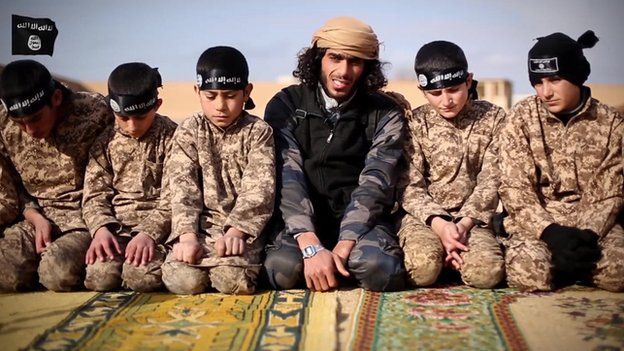
‘Every day, we had to be in bed by ten. We got up six hours later and they kept us busy around the clock,’ Majdal explains. Between the hours of 4 and 5 am, the boys had to perform Islamic morning prayers. Intensive military training came next – lasting several hours – followed by theory lessons about the life of the Prophet Mohammed, the Koran and Islamic military law. The classes went on until late at night. ‘We had no time to memorize the passages, but Daesh didn’t care. If they found out we hadn’t been studying, they bound our hands and feet and beat us with electrical cables.’
At night in the dorm, Majdal could hear the other Yazidi boys crying for their mothers. ‘Don’t cry,’ he’d say, trying to comfort them. ‘If they find out you miss your family, they’ll make life miserable for you. Act like you’re one of them, and some day you’ll be free.’ That ended up being his survival strategy as well.
During the final phase of boot camp, he’d been dreading the day when he would ‘graduate’ with eleven other boys. His unit was then sent to the outskirts of the Syrian city of Aleppo to fight the Free Syrian Army. At first, Majdal and a few other Yezidi child soldiers from his unit refused. ‘It’s either fight or starve,’ the jihadists threatened. Their meals were laced with drugs. ‘After eating, I felt invincible, like a hero. If they’d asked me to set myself on fire, I would’ve done it without any hesitation,’ Majdal said.
One particular event is etched in Majdal’s memory, the moment when Bassem, a sixteen-year-old Yazidi boy, was killed. ‘We saw the enemy in the distance. Before any shots were fired, Bassem rushed at them and started shooting. Just as suddenly, he sat down, calm as you please, in the open field. That’s when the FSA fighters shot him dead.’
No one can say for sure if Bassem was planning to give himself up or if it was a suicide attempt. For the first time during our talk, Majdal gets tears in his eyes. To distract himself, he takes out his phone and opens his Facebook page. He adds Bati and me. ‘My friends are in heaven now,’ Majdal said, while scrolling through his timeline.
During his captivity, Majdal did what he could to avoid combat. One day he pretended to be sick, hoping he wouldn’t be sent to the front. The leader grabbed a large club and hit his left arm. ‘They took me to the hospital. My arm was broken, and I was still a prisoner, but at least I didn’t have to fight.’
Because Majdal was temporarily unfit for battle, he was assigned work in a gun store, which was a secret arms depot as well. Similar storage facilities were a prime target for airstrikes by the Syrian government as well as the international coalition. It was a dangerous place, but the chance of survival was still better there than on the front line.
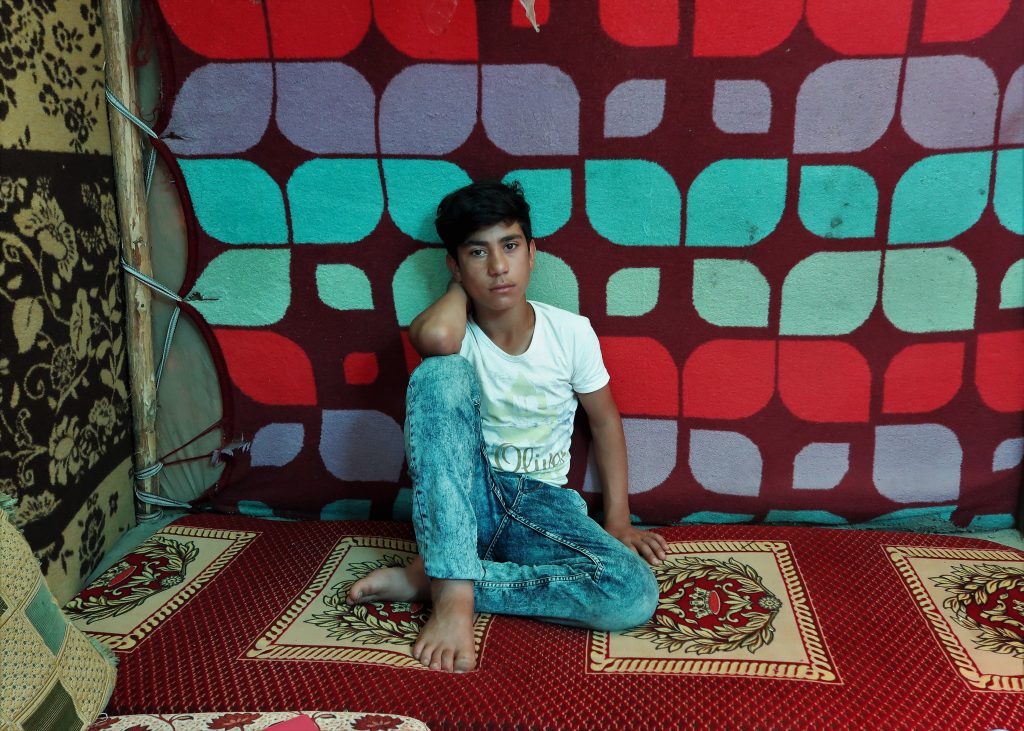
In addition, his new job offered more opportunities for escape. He worked in the gun store with a boy named Abu Khattab, the 12-year-old son of a prominent Lebanese IS commander. Majdal tried to befriend him in the hopes of gaining some extra privileges. His plan worked, and the two became close while repairing weapons and cleaning the shop. Abu Khattab even put in a good word for him, so he was sometimes allowed out without supervision. Later, he would take advantage of that freedom to call his brother in Iraqi Kurdistan using a cellphone one of the fighters had left behind. Then, Majdal’s family devised a secret plan to smuggle Majdal out of the caliphate.
Majdal escaped, but he still doesn’t feel very free. He is worried about the fact that his community has been living in tents for years now, hardly receiving any assistance. Majdal never thought that life after his liberation would be like this. He’s not been offered any psychological help and isn’t allowed to go to school because there are no provisions for children who’ve missed so many years of education. ‘To be honest, I don’t think about the future; I just need to rest,’ he says slowly. He has bags under his eyes from exhaustion.
‘Do you what happened with the Yazidi boys who fought alongside you?’ I asked.
Majdal shakes his head. ‘They must be dead by now.’ He can’t be sure, but he suspects that ninety per cent of the boys from his front-line unit were killed.
‘Why did IS send you in first, when that was so obviously futile?’ I ask.
‘As cannon fodder to clear a path for the adult fighters, so we would die first,’ he replies sadly.
I swallow. Farhad too, seems at a loss for words.
‘So much cruelty,’ I mutter. I pretend I’m busy taking notes, but my eyes well up so much I can hardly see. The tears leave rings on my fake notes. I rip the sheet of paper from my notebook and crumple it up. A journalist who starts to cry is of no use to anyone, especially a teenager who was imprisoned by IS.
Finally free
When we first met, Majdal had the look of an old man in his eyes. Haunted my nightmares, he woke up every night, covered in sweat and confused. When he talked about his captivity, he tried to hide his feelings. Sometimes it worked, most of the time it didn’t, and then a tear slipped down his cheek. One day my friend Ismael, whose brothers experienced the same thing during their captivity, was also present. ‘I feel the same pain, it is ok to cry,’ he said. Ismael and Majdal hugged like brothers. Then I realized that the Yazidis had discovered the best way of healing: mourning together, as a community.
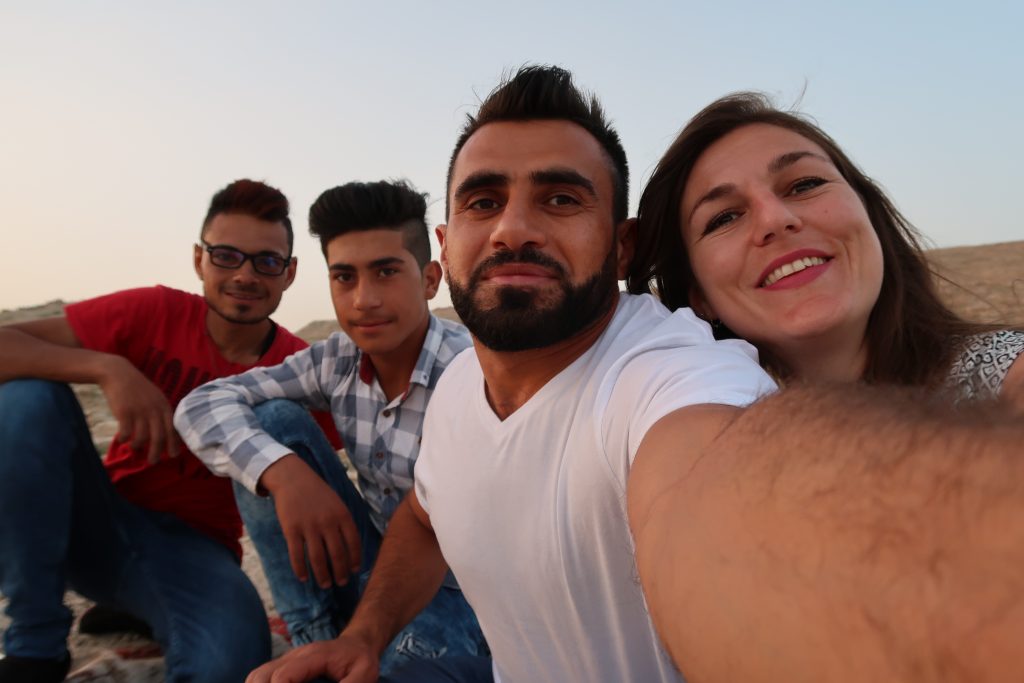
I saw Majdal at his best, his worst and everything in between. At the age of fifteen he shily told me that he had a girlfriend. At the age of sixteen he worked in the fields to earn some extra money. The last time we met, we sat at a mountain near the displacement camp. Majdal suddenly pulled out a pack of thin, minty cigarettes from his pocket. ‘Do you want one?’ he offered me with a big smile. He lit one, but not after I gave him a lecture on the dangers of smoking. That’s what big sisters do.
From a traumatized boy I watched him turning into a confident bright, and kindhearted young man. The nightmares disappeared, the trauma lessened, but the worries remain. Majdal worries about everything: not going to school, living in a camp, his family in Germany, the future of the Yazidi community. But most of all he thinks about his missing sister. She has been in captivity since 2014.
Majdal never expected to see her again. But Taus Melek ( the peacock angel Yazidis believe in) works in mysterious ways. On the day before August 3, his relative in Germany sent me a video. Majdal was crying, but this time they were tears of joy. Because after seven years of captivity, his sister Sipan was finally home.
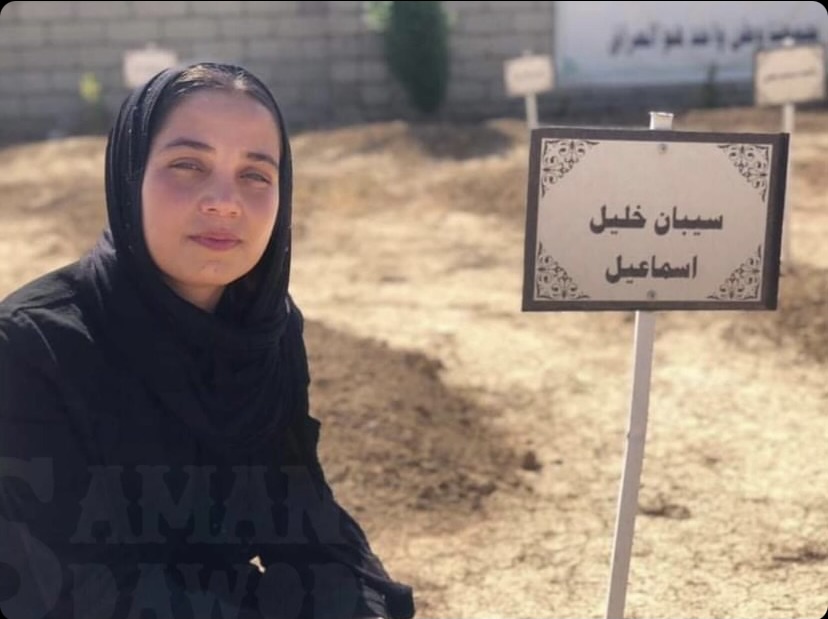
Thank you for reading this article. If you appreciate it, you can make a donation. This way I can write new articles and keep you informed about the Yezidi case. You can adjust the amount manually.
